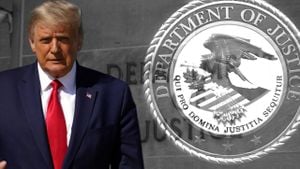The conservative tide swept through Germany as Friedrich Merz, leader of the center-right Christian Democratic Union (CDU), claimed victory in the national election held on February 23, 2025. The election culminated in the ousting of the incumbent Chancellor Olaf Scholz from the Social Democratic Party (SPD), marking a significant shift in the German political atmosphere.
According to exit polls reported by Fox News, the CDU garnered approximately 29% of the votes, leading to Merz’s ascent where he must now form a coalition government. The right-wing Alternative for Germany (AfD) finished strongly as well, marking its best showing since World War II and frustrating many traditional party lines within Germany.
Former President Donald Trump celebrated the election results, stating on Truth Social, "LOOKS LIKE THE CONSERVATIVE PARTY IN GERMANY HAS WON THE VERY BIG AND HIGHLY ANTICIPATED ELECTION. MUCH LIKE THE USA, THE PEOPLE OF GERMANY GOT TIRED OF THE NO COMMON SENSE AGENDA, ESPECIALLY ON ENERGY AND IMMIGRATION, THAT HAS PREVAILED FOR SO MANY YEARS." His remarks suggest he views this as part of a broader conservative resurgence globally.
The snap election arose amid continued challenges for Scholz’s coalition, as Germany is currently grappling with illegal immigration issues and economic difficulties exacerbated by the repercussions of the Russia-Ukraine war. Scholz’s Social Democrats faced harsh losses, resulting in his concession where he stated, "This is a bitter election result for the Social Democrats and this is an election defeat." These sentiments reflect what many observers have described as the party's unsettling performance, expected to be their worst since post-war elections.
Merz acknowledged the challenges awaiting him. He remarked, "It will not be easy," indicating his awareness of the steep tasks of governance and coalition-building ahead. He has indicated plans to roll out his 15-point plan aimed at overhauling immigration policies, which include tightening borders and the deportation of rejected asylum seekers.
During this period of political recalibration, the AfD has doubled its vote total from previous elections, driven by rising discontent surrounding immigration and security policy. The party, led by Alice Weidel, is poised to play a significant role going forward, even as Merz has publicly stated he will not seek cooperation with AfD amid concerns about its far-right ideology.
This election was held against the backdrop of severe issues plaguing Germany, including widespread economic stagnation and pressures to reform immigration. Voters were clearly influenced by the urgency to reshape Germany's approach to these pressing matters as they cast their ballots.
Turnout for the election was notable, with voting topping 52% hours before closures—significantly higher than the 2021 election at the same time. Polling stations across Germany, including some unconventional locations such as car dealerships and restaurants, reflected the active engagement of voters ready for change.
Looking forward, the formation of Merkel's successor's government may tip the balance within European politics, particularly with the prospect of U.S. foreign policy under Trump. The CDU’s new approach under Merz will be pivotal as it seeks to defend European interests amid the tensions of new global alignments.
Expectations surrounding the CDU's new leadership and its ability to deliver on economic and immigration reforms will come under close scrutiny. The incoming government must navigate the complex relationship with the AfD, ensuring partnerships do not undermine Germany’s established democratic principles—what many term as the “firewall” against far-right influence.
The German electorate have made their voices heard, signaling their desire for change. With the challenges posed by the incoming government, the Germany of tomorrow stands poised at the crossroads of tradition, reform, and the pressing issues of modernity. The world will watch closely as Merz and his coalition turn promises of revival and stability from campaign rhetoric to the reality of governance.



